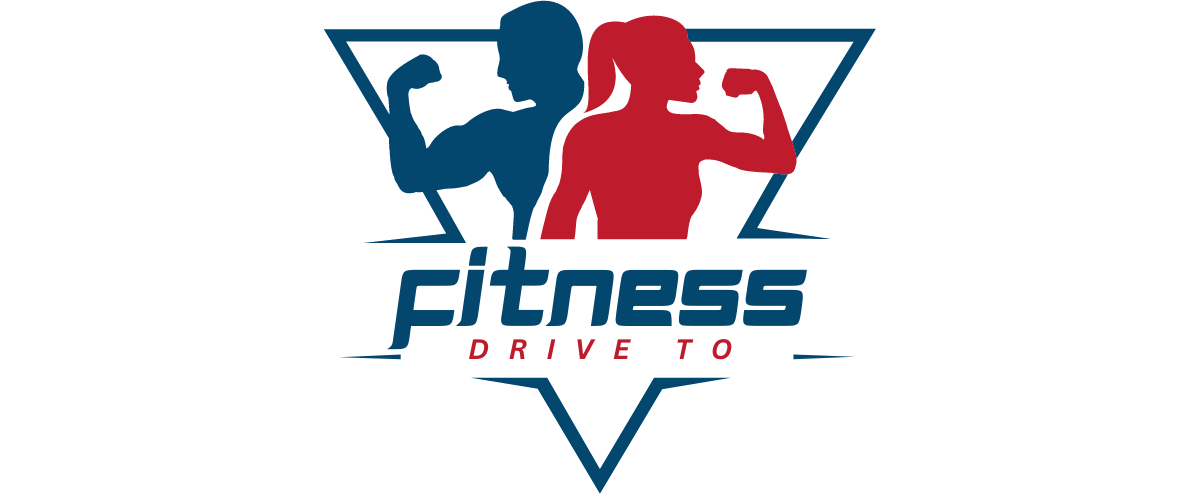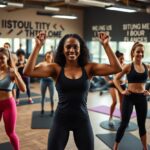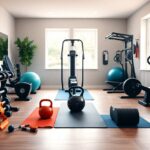Wellness goes beyond just hitting the treadmill; it envelops every aspect of your life. Understanding and applying the 5 components of fitness—cardiovascular endurance, muscular strength, muscular endurance, flexibility, and body composition—can significantly enhance your daily activities. Whether it’s climbing stairs with ease or enjoying recreational sports, integrating these elements into your routine can lead to improved quality of life and reduced risk of chronic illnesses. Discover how a holistic approach to fitness can empower you in ways you may not have imagined.
Key Takeaways:
- Physical Fitness enhances everyday tasks by improving strength and endurance, making activities like carrying groceries or climbing stairs easier.
- Cardiovascular Health promotes better heart function and stamina, which can help you keep up with daily demands and maintain energy throughout the day.
- Flexibility reduces the risk of injury, allowing for smoother movements and greater ease during activities such as bending and reaching.
- Body Composition impacts overall body function and energy levels, influencing how you feel while engaging in daily routines.
- Balance is necessary for preventing falls and maintaining stability, particularly as we age or navigate uneven environments.
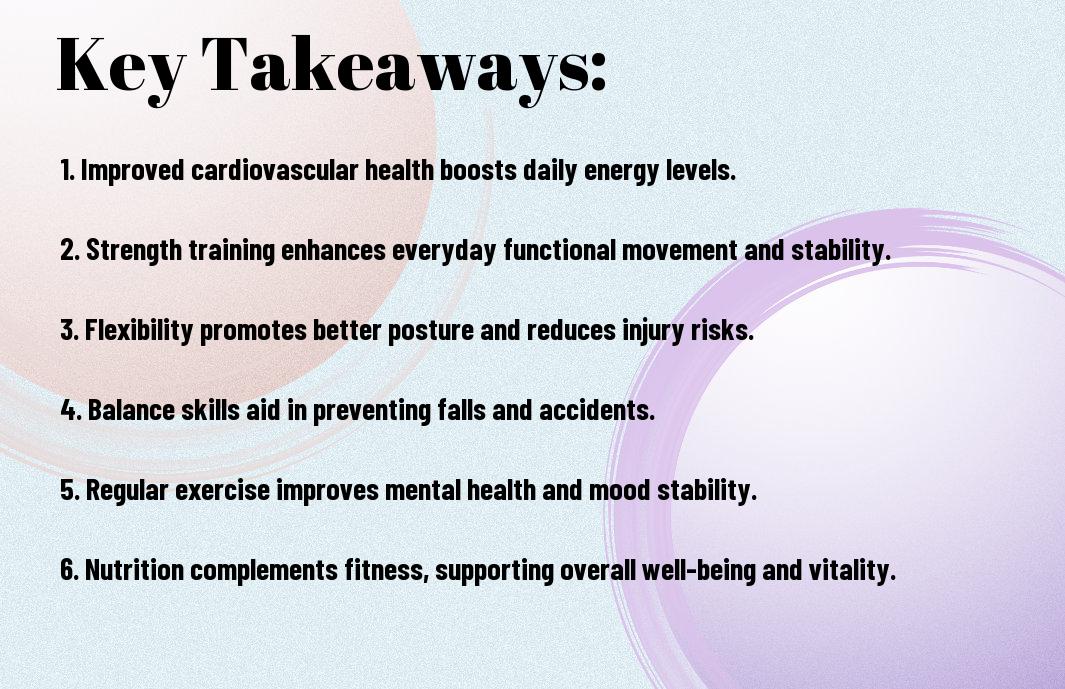

Understanding the Five Components of Fitness
While many people associate fitness exclusively with gym workouts, understanding the five components of fitness—cardiovascular endurance, muscular strength, muscular endurance, flexibility, and body composition—can enhance your daily life significantly. Each of these components plays a vital role in your overall health, impacting everything from your daily activities to your emotional well-being. By focusing on these elements, you can improve not only your physical abilities but also your quality of life.
Cardiovascular Endurance
Among the five components, cardiovascular endurance is paramount as it measures your heart and lungs’ efficiency during physical activity. Engaging in activities that elevate your heart rate will improve your stamina, allowing you to perform daily chores with greater ease and energy.
Muscular Strength
Across various activities, muscular strength refers to your muscles’ ability to exert force. This strength not only enhances your performance in sports but also contributes to everyday tasks such as lifting objects or maintaining good posture.
The importance of muscular strength cannot be overstated. Stronger muscles support your joints, reduce the risk of injury, and improve overall functionality in your daily life. This means you can engage in hobbies, play with your children, or even carry groceries without feeling fatigued or strained.
Muscular Endurance
Below muscular endurance refers to the ability of your muscles to perform repetitive tasks over an extended period of time. This is imperative for activities such as walking long distances or even doing household chores like cleaning.
In addition to making daily activities easier, improved muscular endurance contributes to better overall performance in various sports. This endurance allows you to sustain physical exertion longer, which is particularly beneficial in organized sports and recreational activities, reducing the likelihood of premature fatigue.
Flexibility
Beside the other components, flexibility is vital as it offers the range of motion within your joints. Enhancing your flexibility can help you avoid injuries and improve posture, which positively affects how you feel throughout the day.
Five stretching exercises focused on major muscle groups can greatly increase your flexibility. This not only helps in preventing injuries but also improves blood circulation, contributing to a more relaxed and balanced state in everyday life.
Body Composition
Among the components, body composition refers to the ratio of fat to lean mass in your body. Understanding your body composition helps you develop a clearer picture of your health, beyond just weight alone.
For instance, measuring body composition can guide your exercise and dietary choices. Striving for a balanced body composition can lead to improved health markers like blood pressure and cholesterol levels, enhancing your well-being and reducing the risk of chronic diseases.
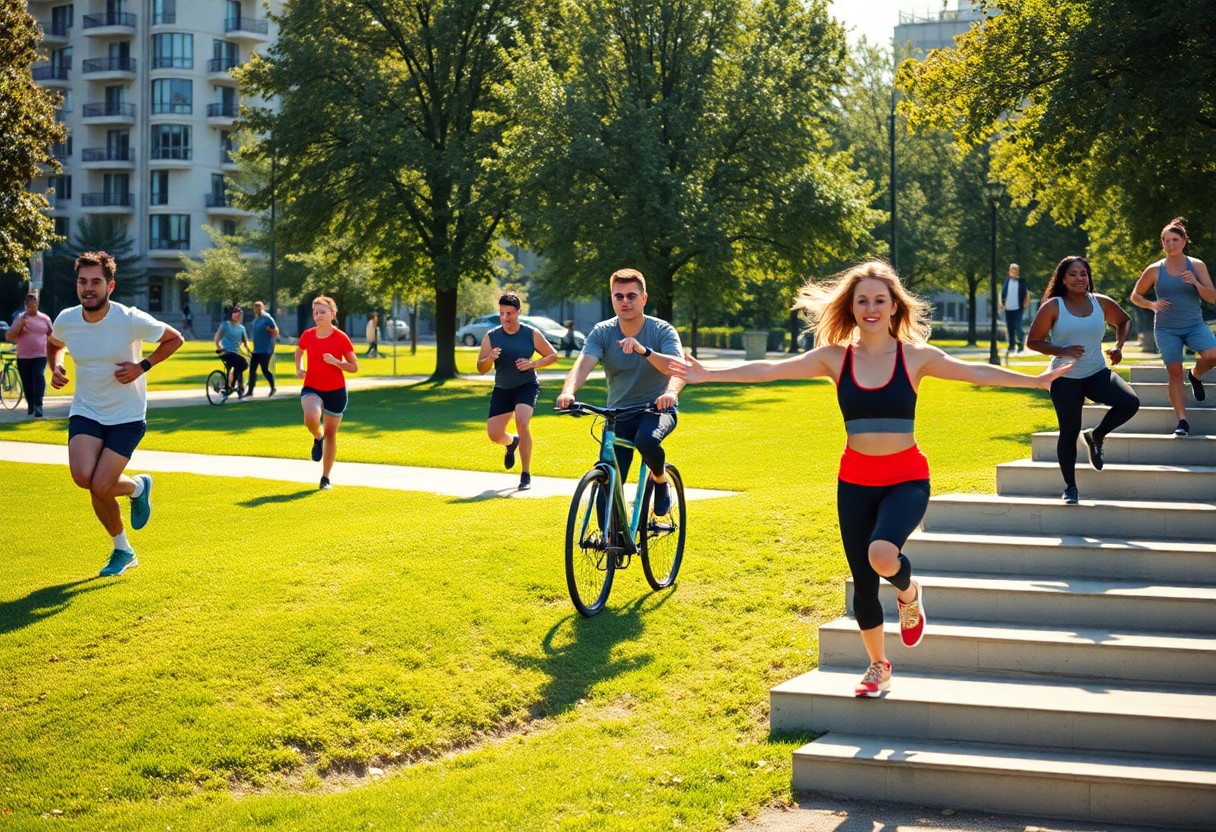
The Role of Cardiovascular Endurance in Daily Activities
Keep in mind that cardiovascular endurance significantly impacts your everyday life. Improved endurance enables you to engage in daily tasks, like climbing stairs or running errands, without feeling fatigued. When you enhance your heart and lung capacity, you boost your overall energy levels, allowing you to tackle more activities with ease. It’s also vital for reducing the risk of chronic diseases, which can seriously affect your quality of life. By prioritizing cardiovascular fitness, you can enjoy a more active, vibrant lifestyle that supports your well-being in every aspect.
Strength Training for Better Daily Functionality
Now, incorporating strength training into your routine can significantly improve your daily functionality. By building muscle strength, you enhance your ability to perform everyday tasks such as lifting grocery bags, climbing stairs, or playing with your children. This not only makes activities easier but also reduces the risk of injuries associated with strain or falls. Furthermore, regular strength training boosts your metabolism and contributes to better overall health, making it easier for you to maintain an active lifestyle. Prioritize strength training to ensure that your body remains robust and resilient for years to come.
The Importance of Flexibility and Mobility in Everyday Life
Despite a common misconception that flexibility and mobility are only important for athletes, they play a vital role in your everyday activities. Improved flexibility helps you perform daily tasks with ease, reducing the risk of injury and discomfort as you age. Incorporating stretching into your routine can enhance your range of motion, making movements like bending, lifting, and reaching less strenuous. By prioritizing mobility, you not only protect your joints but also experience greater overall well-being and convenience in your daily life.
Enhancing Work and Leisure Activities Through Fitness
Not only does fitness improve your physical health, but it also significantly enhances your performance in work and leisure activities. By focusing on the 5 components of fitness, you can increase your endurance, strength, and flexibility, allowing you to tackle daily tasks with ease. Whether you’re lifting heavy boxes at work or playing with your kids in the park, a well-rounded fitness regimen can boost your energy levels and mental clarity. This means you can enjoy your free time more fully and accomplish work-related tasks more efficiently.
Emotional and Mental Benefits of the Five Components of Fitness
All of the five components of fitness—muscular strength, endurance, flexibility, body composition, and cardiovascular fitness—play significant roles in enhancing your emotional and mental well-being. Engaging in regular physical activity releases endorphins, often referred to as “feel-good” hormones, which help reduce feelings of stress and anxiety. Improved physical fitness also boosts your self-esteem, giving you the confidence to tackle daily challenges. Furthermore, achieving fitness goals fosters a sense of accomplishment, helping to cultivate a positive mindset that translates into all areas of your life.
To wrap up
Summing up, integrating the five components of fitness—cardiovascular endurance, muscular strength, muscular endurance, flexibility, and body composition—into your daily routine can significantly improve your overall quality of life. By focusing on these areas, you are not just enhancing your performance in the gym but also boosting your energy levels, reducing stress, and improving your daily functionality. Prioritizing these components empowers you to embrace a healthier lifestyle that extends well beyond exercise, leading to a more fulfilling and active life.
FAQ
Q: What are the 5 components of fitness discussed in ‘Beyond The Gym’?
A: The five components of fitness highlighted in ‘Beyond The Gym’ include cardiovascular endurance, muscular strength, muscular endurance, flexibility, and body composition. Each of these components plays a significant role in maintaining overall health and well-being, influencing not only physical performance but also the ability to engage in daily activities with ease.
Q: How does cardiovascular endurance impact my everyday life?
A: Cardiovascular endurance is necessary for efficient heart and lung function. It allows you to perform daily tasks, like walking up stairs or carrying groceries, without excessive fatigue. Improved cardiovascular health can also enhance your mood and energy levels, making daily activities more enjoyable and less taxing.
Q: Why is muscular strength important outside of the gym?
A: Muscular strength enables you to perform physical tasks like lifting, pushing, or carrying with greater ease and safety. Strong muscles reduce the risk of injury during daily activities and contribute to better posture. By building muscle strength, you can enhance your overall functional ability, making it easier to manage daily chores and recreational activities.
Q: What role does flexibility play in my daily routine?
A: Flexibility is vital for maintaining a full range of motion in your joints, which can improve your overall mobility. Increased flexibility helps prevent injuries during everyday movements, such as bending down to tie your shoes or reaching for items on a high shelf. It can also alleviate tension and discomfort, contributing to better overall movement quality.
Q: How can body composition affect my daily life and activities?
A: Body composition refers to the ratio of fat to lean mass in the body. A healthy body composition can enhance physical performance and energy levels, allowing you to engage in various activities with less effort. Additionally, maintaining a balanced body composition supports overall health, reducing the risk of chronic diseases and enabling a more active lifestyle.
